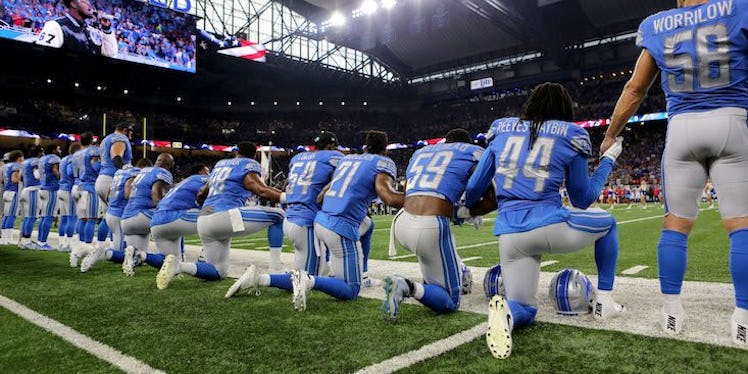
The Latest Round Of NFL Protests Look Different, But They're Not Stopping
Week four of the Donald Trump-NFL saga is underway. While the president warns teams to stand and honor our National Anthem before kickoff, players continue to do what feels right — and in many cases, that means kneel. As the controversy continues, here's what to know about which NFL teams took a knee as protest.
Though there are number of players protesting, the way in which they do so is evolving. While some take the knee —something first done by former San Francisco 49ers quarterback Colin Kaepernick — others are raising fists and linking arms.
Though fans aren't seeing players kneel quite as much as as they did in the first few weeks, they are witnessing linked arms, fists, and other acts of protest, according to The Washington Post. Some teams have a collective response to the National Anthem, while others allow individual players to do whatever they choose. As of week three, Sept. 24, roughly 150 players took the knee or protested in some way, according to New York Magazine. And now week four continues to see protests, though more players are standing, according to The Washington Post.
So what's been happening in week four thus far?
As of around 4:30 p.m. ET on Oct. 1, plenty, if not as much as last week. According to The Washington Post, The Los Angeles Rams linked arms while Robert Quinn raised his fist. The New England Patriots and Dallas Cowboys stood, and Baltimore Ravens and Pittsburgh Steelers followed suit. Some of the players on the Buffalo Bills took a knee while the Cleveland Browns stood with their fists in the air. The New Orleans Saints collectively kneeled while some players of the Miami Dolphins did as well. About 30 members of the 49ers, whose former teammate Kaepernick started the protest and who hadn't played since before Trump's comments, took a knee for the anthem at their game against the Arizona Cardinals. And Marshawn Lynch of the Oakland Raiders showed up for the team's 4:25 p.m. ET game against the Denver Broncos wearing a shirt that said, “Everybody vs. Trump.”
The changing protests are the latest update to the list of players who participated in protests over the past few weeks.
Sports Illustrated offered an inclusive list of who kneeled, sat, raised fists, and protested in some way for the past three weeks, which has included Eric Reed of the 49ers kneeling, Cameron Jefferson of the Bills raising a fist, and Jermey Lane of the Seahawks standing with his back to the flag, among many others. SI even included a list of protests from pre-season.
Before Sunday games and meet-ups across the country took place on Oct. 1, President Trump took to Twitter to share his thoughts (again) on the issue and provide a warning to those who were on the field. In between tweets about Puerto Rico, he said, “Very important that NFL players STAND tomorrow, and always, for the playing of our National Anthem. Respect our Flag and our Country!”
He has yet to comment on JAY-Z's Colin Kaepernick jersey that he wore during the SNL season opener. During his performance of “Bam” alongside Damian Marley, the rapper turned around to face the camouflage background and revealed a “Colin K” on his black number 7 jersey. Some were totally in favor of this move, but there were those who had a problem with making a political statement during his performance.
Regardless of personal stances on the issues of either the right to protest or police brutality — the original subject of the protest — it's safe to say the #takeaknee movement has definitely gotten the attention of football fans, and the rest of the country.
But the National Anthem in sports actually has a pretty interesting history... and a surprising one at that.
Around WWII, the country was swept up in a wave of patriotism, and rightfully so. This feeling, combined with new technology, allowed stadiums to play recordings of the anthem regularly over a speaker system instead of hiring a band, according to CNN. After the war ended, then-NFL commissioner Elmer Layden argued to keep the anthem tradition in place.
OK, fair enough. But while the NFL's game operations manual states, “The National Anthem must be played prior to every NFL game, and all players must be on the sideline for the National Anthem,” for a long time it wasn't the case. Players weren't required to be on the field for the anthem until 2009, according to Snopes. Which isn't terribly lengthy tradition in the grand scheme of things, is it?
Since the #takeaknee movement has been gaining traction in other sports and continues to make a statement in football, it's definitely hard to separate sports and politics now.